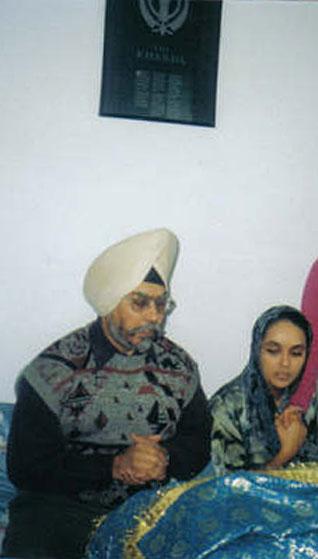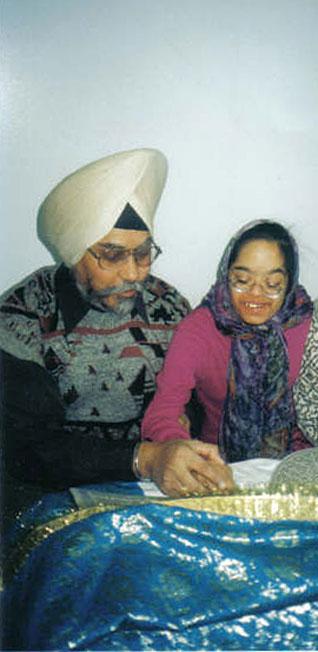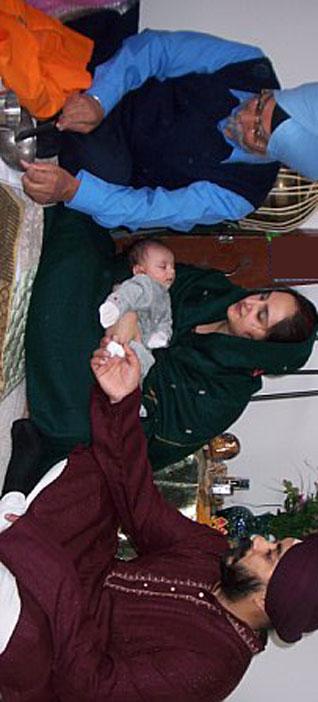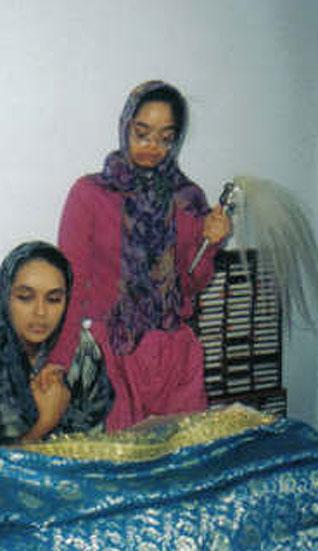
Father
&
daughter
Above: Our daughter, Manpreet Kaur, completes a "Sahaj Paatth". Below, 3rd from bottom: Our younger daughter Kirat (who has Downs Syndrome) enjoys paatth. 2nd from bottom: "Janam-sanskar" of our grandson Gursahej Singh, with his parents.



Manpreet
&
Kirat
Faith
My Guru & I
by PASHAURA SINGH
This is the first of a series of articles we have asked a wide variety of personages to pen in commemoration of the Tercentenary (1708-2008) of the investiture of Guru Granth Sahib as our eternal Guide and Teacher.
This year, we are celebrating the 300th anniversary of the investiture of the Sikh scripture as the living embodiment of the Guru.
It is an occasion that offers us an opportunity to reflect on our relationship with the most revered Guru Granth Sahib.
Like any other child born in a Sikh family, my first exposure to Sikhi came from my mother. She sowed the seed of Gurbani ("Guru's Utterances") within me in my early childhood.
I was about seven years of age when she instructed me to learn one stanza (pauri) of the Japji Sahib by heart within a day or two. After learning that stanza, I would recite it to her from memory to receive a reward of one paisa (Indian penny) for each stanza I subsequently recited.
It took about two months to memorize the complete Japji Sahib and my mother gave me a rupee and a quarter to celebrate the acquisition of my richest possession.
Since then, Japji Sahib has remained embedded in my memory.
Following the same process, I learned the other banis of Nitnem ("daily routine"). I was simply following the example of my mother who had learned these sacred compositions, including Guru Arjan's Sukhmani Sahib, by heart by the age of thirteen.
She used to compare the memorization of Gurbani by heart with the acquisition and possession of money (Gurbani kanth paisa ganth), in that it is readily available for use in every act of reflection, moral deliberation, as well as in times of personal crises. Her living relationship with Gurbani touched my heart, mind and soul in the most intimate ways in my formative years.
Occasionally, I saw my mother reciting Sukhmani Sahib even during her sleep.
I was in the seventh grade at Guru Hargobind Khalsa Higher Secondary School, Gurusar Sudhar, when my father died from surgical complications at the Dayanand Hospital, Ludhiana, on 14 April 1962.
At the conclusion of the Sahaj Paath ("Reading of the Guru Granth Sahib") in his memory, Granthi Inder Singh encouraged me to come to the gurdwara every evening. He began tutoring me along with other boys from my village in the reading of the Guru Granth Sahib through the traditional mode of santhia ("Lessons") of Gurbani.
We used to gather in a circle at the gurdwara to recite five to ten pages of a two-volume set of the Sikh scripture in each sitting after Granthiji explained to us the correct enunciation of the passages of Gurbani. We were required to repeat those pages eight times before the next sitting on the following day.
We would absorb and rehearse those lessons until Granthiji was completely satisfied. This process went on for more than six months to complete the reading of the Guru Granth Sahib.
I participated in my first Akhand Path ("Unbroken Reading") to celebrate the birth anniversary of Guru Nanak in November of 1962. It was a joyous occasion when I graduated as an Akhand Pathi.
Granthi Inder Singh was a most learned man, with a remarkable command of languages, including Persian and Sanskrit. His understanding of the deeper aspects of Gurbani had a magnetic effect on my learning process. Previously a teacher at a local school, he left his job to become a Granthi at our village gurdwara.
I also learned to perform kirtan at that time. The following year, I stood first in the middle standard examination and won a scholarship. I ascribe my academic success that year to my relationship with the Guru Granth Sahib.
My teachers at school, Master Jaswant Singh, Master Gurbax Singh, Master Gursevak Singh, Master Joginder Singh, and Principal Bhagwant Singh, took a keen interest in my education and always encouraged me to excel in my studies. These individuals were my role models as dedicated Sikhs who taught Sikh history and Gurbani, all the while teaching me Mathematics, English and other subjects.
Our school day always began with a morning assembly prayer at the historical gurdwara commemorating Guru Hargobind's stay at our village. It consisted of keertan, ardaas and vaak ("Order of the day") from the Guru Granth Sahib, followed by instructions by the Principal. The environment at the school was so conducive that it strengthened my love for devotional singing of Gurbani.
Most of my school teachers were active associates of Bhai Randhir Singh. They used to perform rehan sabaai kirtan ("all night devotional singing") with him when he was alive. After him, they frequently organized kirtan programs in the neighbouring villages and cities, and I eagerly participated in them.
Our School jatha ("group") was well known in the surrounding areas for performing Sikh weddings (Anand Karaj), kirtan programs and Gurparab celebrations on a voluntary basis.
After completing a B.Sc. degree at the G.H.G. Khalsa College, Gurusar Sudhar, I joined the Government College, Ludhiana, to do an MA in Mathematics.
Something here changed the course of my life.
On 10 January 1971, my mother instructed me to start a reading of the Guru Granth Sahib, to complete within a week. I was asked not to go to college during that week. I would read the Guru Granth Sahib and my mother would listen with perfect concentration. In the evening, my mother would tell me about her life experiences and would advise me to focus my attention on the study of the Guru Granth Sahib.
On the final day, before completing my reading of the Guru Granth Sahib, she gave me a number of instructions, including a specific one that no one should be allowed to cry at her death. I just listened to her conversation without even considering that it would be her parting request.
On the morning of Sunday, 17 January 1971, I started devotional singing of Asa di Var and then completed the Bhog ceremony of the Guru Granth Sahib. After the congregational prayer, I took the Vaak (a verse picked at random) and read Guru Ram Das's hymn in Jaitsiri mode that ended with the line:
"At Dharamraja's portal, the records of the devotees are torn, says Nanak, and their reckoning is closed" (dharamrai dari kagadu phare jan nanaku lekha samajha).
At the time of giving karah prashad ("sanctified food made of flour, sugar and butter, and water, and prepared in a large iron dish") to my mother, I told her that her reckoning is closed. She smiled and bowed her head in gratitude. Then we all shared in the communal meal of langar. My mother enquired from me whether everyone had eaten.
My friends came to seek her blessings as they left, and I went outside to see them off.
The moment I left her, she called my sister-in-law and bade her final greeting ("Waheguru Ji Ka Khalsa/ Waheguru Ji Ki Fateh") and passed away.
We started doing kirtan again and urged everyone not to cry at all, but instead to celebrate the gift of her life. This was the moment when I realized the power and authority of the divine Word (Vaak) taken from the Guru Granth Sahib.
My fatherly teacher, Master Jaswant Singh, took me to Patiala to meet with Professor Harbans Singh, the editor-in-chief of the celebrated Encyclopaedia of Sikhism. He was Masterji's student at Khalsa School Muktsar and held him in great regard.
Prof. Harbans Singh inspired me to join Guru Nanak Institute, Gurmat College, at Patiala in 1971 to pursue my interest in the area of Sikh Studies.
The two years spent at that premier institution constituted the most productive period of my intellectual life. I had the rare opportunity to listen to the views of such distinguished scholars as Dr. Taran Singh, Dr. Ganda Singh, Principal Satbir Singh, Professor Sahib Singh, Giani Lal Singh, Professor Piara Singh Padam, Professor Gurbachan Singh Talib, Dr. Avtar Singh, including some visiting Professors of Hindu, Muslim, Buddhist and Christian traditions.
They all provided different approaches to study the various dimensions of the Sikh scripture. At no point did I ever feel that my personal relationship with the Guru Granth Sahib was in jeopardy. Rather, each new perspective added to my close relationship with my Guru.
At Gurmat College, we frequently listened to the discourses of Sant Gurmukh Singh of Patiala in rustic Punjabi. In one of his sermons, he made the distinction between two approaches of reading the Sikh scripture; one with just reading it as a sacred book (Guru Granth Sahib "nu parrhna") and the other was reading "from" the Guru (Guru Granth Sahib "ton parrhna").
Accordingly, the first approach builds intellectual pride (haumai) while the second one makes one humble. He made the point that the real understanding of Gurbani could take place only when we approached it with complete faith in it as the living embodiment of the Guru.
Let me conclude this piece with my ongoing relationship with my Guru.
Each day, I record the Vaak of the Guru Granth Sahib in my journal and try to understand the meaning of life in its light. Often, it provides a divine clue to look at the trials and tribulations of life with equanimity.
After listening to the Vaak from the Darbar Sahib, I go for my morning walk and complete my daily routine of banis (Nitnem) from memory. I have always felt that the Divine Word (Shabad) is an intimate companion in my heart, mind and soul.
This is the spiritual treasure that I inherited from my mother, and this is the inexhaustible wealth that I have already passed on to my children. I have frequently heard the voice of the Eternal Guru, speaking directly to me when I needed the guidance at moments of personal crises.
When I listen to my daughter performing kirtan in the original ragas of the Guru Granth Sahib, accompanied by her brother on tabla, I bow my head in gratitude. This way, I pay my tribute to my Beloved Guru for the countless blessings that I have received in my life.
Indeed, an active engagement with the Divine Word amounts to a one-on-one conversation with the Guru. This spiritual dialogue is the only sure means to self-discovery.
I see the Guru Granth Sahib as the clearest mirror through which we see our "true self", the core of our being.
[Dr. Pashaura Singh, Professor at University of California, Riverside, is its "Dr. Jasbir Singh Saini Chair" in Sikh and Punjabi Language Studies. ]
July 28, 2008
Conversation about this article
1: Pritam Singh Grewal (Canada), July 29, 2008, 4:24 AM.
An interesting tribute to the commendable role a mother and teachers played in a boy's spiritual growth! It reminds me of my own experience of a Sikhi environment in a Khalsa School as well as Kirtan samagams held by Bhai Randhir Singh ji in Narangwal village.
2: Ajeet Singh Nahal (Flushing, New York, U.S.A.), July 29, 2008, 12:05 PM.
My dear Professor Sahibji: Dhan dhan was your mother. Thank you for sharing her legacy of spiritual treasure. With love.
3: Chintan Singh (San Jose, California, U.S.A.), July 29, 2008, 1:10 PM.
A beautiful personal and touching piece - Thank you, Professor Singh, for sharing such intimate details of your life with all of us. Having received my school education at Guru Harkrishan Public School, New Delhi, I could relate to some of your growing-up experiences, though I have not had the good fortune of meeting any of the great personalities you have mentioned. With the kind of relationship you have with the Guru, no doubt you have successfully overcome the challenges you have had in your career as a Sikh academician, which we have heard of vividly.
4: Jaidev Singh Anand (Atlantic City, U.S.A.), July 29, 2008, 1:23 PM.
Dhan Sikh, Dhan Guru!
5: Gurmeet Singh Matharu (Dartmouth, Nova Scotia, Canada), July 29, 2008, 8:26 PM.
Thank you for sharing this piece of writing with us. I was deeply touched by your article, experience and faith in our Guru Granth Sahib.
6: I.J. Singh (New York, U.S.A.), July 30, 2008, 8:56 AM.
The road less travelled - a nicely covered and inspiring account. Much appreciated.
7: Dr. Visho Sharma, Emeritus Professor of Social Science & Sociology (Kalamazoo, Michigan, U.S.A.), July 30, 2008, 1:52 PM.
Professor Pashaura Singh impressed the glitterati of Western Michigan University at a seminar held some years ago. It is rare that you see at first hand the confluence of deep humility and profound scholarship. Dr. Singh's presentation of the evolution of Sikh thought was incisive and piquant; inclusionary of other thought streams; and exciting. The breadth of his vision was clear as he drew analogies in world thought, even as he pinpointed the singular contributions of the Sikh Panth to the universal search for truth and meaning. An evening gurdwara held at my home, furthermore, brought out the talent, of speech and music, that closely binds his family together. Pashaura Singh did full justice to the ongoing celebration of 500 years of the vichitra vichaar pranaali (distinct thought tradition) that Sikhism represents. "Saha Visho Anu Vychalayat Sympatico with his [fellow beings], he walked with them." [Atharva Veda (9/1, Chapter 15)]
8: Tejwant (U.S.A.), July 30, 2008, 4:13 PM.
This beautifully related bond with Ik Oan Kaar shows how the nurturing by one's own parents in the family nest can teach the flock how to use wings to soar to the distant skies, and Dr. Pashaura Singh is just doing that.
9: Ravjot Singh Gill (Delhi, India), July 31, 2008, 11:28 AM.
A very moving and touching piece which goes on to show how mortals achieve peace, happiness and the strength to face the unknown when they become one with God through His teachings and beliefs. Dr.Pashaura Singh, while paying a glowing tribute to his mother, also acknowledges how a right path chosen by parents during early childhood goes on to shape the destiny of the next generation. Though I have never met the great names mentioned in the article, I have been fortunate enough to receive some pearls of wisdom from Dr.Pashaura Singh when I was his student in Guru Harkrishan Public School. I congratulate him on this beautiful article and send him my best wishes for all future endeavours.
10: Tarlok Singh Chowdhary (Harrow, U.K.), July 31, 2008, 7:04 PM.
Insightful, poignant, and deeply profound. The strength, faith and belief you exhibit through your writing is humbling. Professor, you're a fortunate soul, because it's clear that the Guru's Grace has been truly prevalent throughout your life. May Waheguru continue to bless you and your loved ones.
11: Pashaura Singh (Riverside, California, U.S.A.), August 01, 2008, 9:05 PM.
I had not expected this overwhelming response to my brief piece. I am humbled by these magnanimous compliments. I offer my heartfelt thanks to each and every author of these comments. May Akal Purakh bless you all with the spirit of Chardhi Kala. I had no idea that my student Ravjot will establish contact after twenty-eight years. This is the wonder of internet revolution. Sikhchic.com has indeed established itself as the leading online forum, contributing positively to the development of global Sikhism. Once again, my deep gratitude to one and all.
12: Inder Singh (Stockton, California, U.S.A.), August 03, 2008, 11:24 AM.
S. Pashaura Singh ji: I am very touched by the character of your mother, a true gursikh who followed Sikh tenets and inculcated the same in you. It is correct that real gursikhs who have "naam di kamai" can sense the end of their earthly life.
13: Manjeet Singh (Kuala Lumpur, M alaysia), August 04, 2008, 4:45 AM.
The article was good. Pashaura Singh has been a good researcher and is very readable. Guruji's hukam is always 100% accurate. Perhaps, Dr Singh can share with us about gurbani in action in our daily lives as it is a vibrant divine active living force.
14: Jas Sokhal (Detroit, Michigan, U.S.A.), September 16, 2008, 8:11 AM.
Thank you for sharing a very inspirational part of your life. We miss you very much in Michigan, especially your speaking at the Gurdwara.
15: Aruna Sukhija (Dubai, U.A.E), October 03, 2008, 11:07 AM.
I am deeply touched by the meaning of Guru Granth Sahib. I have had the good fortune of having lived with Sant Gurmukh Singh from the age of 5. My mother too has had the blessing of being able to take care of Pitaji(as the sangat calls him) in his old age. He taught me to read Sukhmani Sahib with clarity. He lived for 104 years and gave up his chola in America. My mother went with him and came back with his ashes. He used to call my Daddy "devta". To remain in the company of saints is a blessing. He always connected the sangat to Guru Granth Sahib. He always did simran in our house and the sangat would come and visit him.
16: Surjeet Singh (Detroit, Michigan, U.S.A.), March 30, 2009, 5:20 PM.
Professor Pashaura Singh ji, Thanks for sharing with us a very inspirational and touching life experience. May Waheguru bless you and your loved ones.
17: Ajaisatbir Singh (Patiala, Punjab), September 26, 2009, 2:55 AM.
A very good article. I am Principal Satbir Singh ji's son. If possible, would like to correspond with you.
18: Daniel A. Pschaida (Riverside, California, U.S.A.), February 13, 2010, 4:04 AM.
Thank you for sharing this inspiring story of the development of your close relationship with the Guru Granth Sahib, Dr. Singh. I find it very moving!
19: Dya Singh (Melbourne, Australia), May 29, 2010, 12:25 AM.
'Someone' sent this to me ... I am grateful to that person. Sometimes episodes from one's personal 'path' are the most touching. Thank You, Pashaura Singh ji ...
20: Bhupinder Singh (MI, U.S.A.), August 30, 2011, 2:38 PM.
Your guru, your mother was very close to Akal Purakh. She lives with Him in Sach Khand.
21: Bhai Harbans Lal (Dallas, Texas, USA), July 28, 2012, 11:31 AM.
How did I miss such an inspiring essay? I saw it only today; somehow Google led me to this. Pashaura Singh ji, you were born and raised to be both theologian and academician. Your relationship with the Guru is an example of your humility and your Sikhi-ness in relation to the Guru. Both of those led you to what you are today. From your academic rank and your scholarly accomplishments you are recognized as a top class academician. On the other hand, your training by your mother and deeply committed granthis in your town complemented by teachers at the Punjabi University's Gurmat College prepared you for a career in Sikh theology and as Sikh clergy. Exceptional qualities of your performance as exegete as well as Sikh kirtanyia are hard to match by anyone today. We do not hear about this aspect because you are denied opportunities to serve in that role. Only recently I had a privilege of attending your daughter's wedding in San Francisco and was deeply moved to see that the family began this wedding ceremony with a two-hour kirtan in classical raags prescribed in the Guru Granth. You and your bride daughter, Dr. Manpreet Kaur on the harmonium, your son on tabla, your wife with a string instrument, the bridegroom Dr. Mandeep Singh, and other family, all forming the kirtan singing party at their own Anand Karaj, was a scene I had never experienced before in my life. I will never forget it either. That scene was so unusual that it impelled me to recognize the newlywed couple my heroes in my congratulating remarks. I am encouraged to notice that there are other young Sikhs growing up to follow your example and there will be more such occasions in the future.


